Rachel Neumeier's Blog, page 105
April 19, 2022
The Messages You Send With Your Punctuation
At Kill Zone Blog: Dot…Dot…Dash. The Messages You Send With Your Punctuation
Great topic! Very inviting! And oh, look, the post starts this way:
“If you write properly, you shouldn’t have to punctuate.” — Cormac McCarthy.
That’s really funny! I wonder if he really said that? Apparently he did: Here’s a post about writers who decline to use normal punctuation. Some are remarkably extreme about it. Take a look at the one who doesn’t signal at all when switching from character to character in dialogue. Wow. There’s a guy who doesn’t mind making his readers work hard.
Have any of you read McCarthy’s The Road? Let me see … Okay, here’s an illustrative selection:
They crossed the river by an old concrete bridge and a few miles on they came upon a roadside gas station. They stood in the road and studied it. I think we should check it out, the man said. Take a look. The weeds they forded fell to dust about them. They crossed the broken asphalt apron and found the tank for the pumps. The cap was gone and the man dropped to his elbows to smell the pipe but the odor of gas was only a rumor, faint and stale. He stood and looked over the building. The pumps standing with their hoses oddly still in place. The windows intact. The door to the service bay was open and he went in. A standing metal toolbox against one wall. He went through the drawers but there was nothing there that he could use. Good half-inch drive sockets. A ratchet. He stood looking around the garage. A metal barrel full of trash. He went into the office. Dust and ash everywhere. The boy stood in the door. A metal desk, a cash register. Some old automotive manuals, swollen and sodden. The linoleum was stained and curling from the leaking roof. He crossed to the desk and stood there. Then he picked up the phone and dialed the number of his father’s house in that long ago. The boy watched him. What are you doing? he said.
A quarter mile down the road he stopped and looked back. We’re not thinking, he said. We have to go back. He pushed the cart off the road and tilted it over where it could not be seen and they left their packs and went back to the station. In the service bay he dragged out the steel trash drum and tipped it over and pawed out all the quart plastic oil bottles. Then they sat in the floor decanting them of their dregs one by one, leaving the bottles to stand upside down draining into a pan until at the end they had almost a half quart of motor oil. He screwed down the plastic cap and wiped the bottle off with a rag and hefted it in his hand. Oil for their little slutlamp to light the long gray dusks, the long gray dawns. You can read me a story, the boy said. Cant you, Papa? Yes, he said. I can.
There you go! I don’t suggest most writers try that. I did read The Road all the way through, by the way. I even sort of liked it. It’s extremely dark, but redeemed by a moment of light right at the end. I started to type “a moment of hope,” but I’m not sure I’d go that far. Hope is rather a stretch. But light, yes. I feel compelled to add, one does get used to the lack of quotation marks. Even so, I can’t say I think experimenting with quirky punctuation is a good idea for most of us.
But back to the post! Let’s take a look:
Ah, the author of the post — PJ Parrish — also comments about The Road.
When I first started the book, the lack of punctuation annoyed me. It wasn’t that the narrative was unclear or that I was confused. It just felt pretentious, as if the author were saying he was above all things mundane. And if you believe his quote at the beginning of this post, you’d say he was just being a….well, you fill in the blank. … After a while, I didn’t care about the punctuation. The story sped along, the characters captured me by the throat and by the heart.
I agree, pretty much. I did find the story gripping and I read it fast. I’ll never re-read it, however.
Parrish goes on to discuss Faulkner and then contrasts McCarthy and Faulkner by looking — get this — JUST at the punctuation, with the words removed! Hah! That’s a really neat idea! I love it. Wow, there’s a tremendous difference.
So this post is really about punctuation as part of the author’s voice or style. Interesting! I don’t remember ever seeing a post on this topic before. Parrish says:
I think most of us, myself included, don’t think too much about the punctuation we use. We know the basics of periods, question marks and quotation marks. We get a little confused about commas, and when to use dashes or ellipses. And we have banished the poor semi-colon to the grammar dungeon. We put in the symbols quickly and race on, saving our tsuris for the big issues of plot, characterization and theme. But I’d like to suggest today that we give more thought to [punctuation marks].
I, of course, disagree with absolutely everything in that paragraph other than giving thought to punctuation. I don’t believe I get confused about commas very darn often. Commas are, of course, partly a matter of taste, and I know my tastes have changed over the past however many years and will no doubt change again, but I do know the rules and know what choices I’m making. I know the difference between dashes and ellipses — the difference isn’t even subtle … right? And I love semicolons; so much so that I make an effort to go through and remove about a third of the semicolons I put in to start with. There are still plenty left.
Anyway, a good discussion of punctuation ensues, with examples. I am persuaded by the main point, which is that punctuation is certainly an important element of style and voice; also that punctuation contributes in important ways to pacing, tone, and even genre.
Please Feel Free to Share:






The post The Messages You Send With Your Punctuation appeared first on Rachel Neumeier.
April 18, 2022
The Truth About Writer’s Block
Here’s a post at Writers Helping Writers: The One Popular Myth Writers Believe About Writer’s Block
What, you’re probably asking yourself, is that myth?
Right: That there’s no such thing as writer’s block. I bet you knew that.
I agree, incidentally. That is a myth. Writer’s block is certainly real, sometimes in the way described in the linked post and sometimes in other ways. This post says:
Draft after draft, I came up against a wall. No matter how hard I tried or how many hours I put in, I could not figure out how to get past the midpoint of that novel…. This is what finally led to a breakthrough for me. I went to see Girl on a Train … I was fascinated by how the story was told. For much of the movie, the main character didn’t know what had happened to put her into her current situation. It was something I had never explored before: what if my hero was in the dark as to what had happened? Voila! Breakthrough.
This article is clearly about is Type II Writer’s Block: a plot point isn’t working and therefore you’re stuck.
Here are the three types of writer’s block, as far as I can tell:
Type I: The writer lacks enthusiasm for some part of the book. She needs to establish a daily minimum, sit down, and write the darn book. Or she needs to take effective action in some way to make herself move forward. This is indeed a discipline issue.
For people who have finished multiple novels, I don’t think this kind of writer’s block occurs. That is, it does, but they know how to handle it, with daily minimum wordcounts or whatever else works for them.
That’s why experienced authors sometimes declare that writer’s block doesn’t exist; they know how to handle lack of enthusiasm and they haven’t happened to hit any other form of writer’s block. That’s nice for them, but not helpful in delineating other problems.
Type II: The writer runs aground on some plot point. Something isn’t working and she can’t move forward until she figures out how to solve that problem. For the linked post, the epiphany was What if my protagonist doesn’t know what’s going on? I must say, that’s a great notion. I see why this change helped kick the stalled novel into motion.
For me, when I was stuck with Invictus for so long, my brother finally made the right comment. What if they aren’t actually at war? I’m not even sure why that did it, but that question made me view the events of the story from just the right angle. Finally, at long last, I was able to figure out what every character was trying to achieve and why, and therefore at last I could move forward.
At other times, the key has been suddenly realizing that I should bring a new character onto the stage and that would make the first protagonist’s plotline fall into place. In fact, that exact realization was key to finishing my first-ever (unpublished, unpublishable) fantasy novel. That was important because finishing your first novel-length project gives you the confidence that you can finish novels, which I think is crucial.
The realization can be anything. This is the wrong protagonist, this is the wrong relationship, the plot is getting needlessly complicated with endless subplots, whatever. As soon as the author figures out what the story should be doing, everything smooths out. (At least for a while.)
Type III: The writer is suffering from clinical depression. Nothing is going to help until the author gets appropriate treatment.
It’s really important to get that writer’s block may not be a thing in itself, but a symptom of a broader problem. I suspect this can be hard to recognize from the inside, as someone who is clinically depressed is also probably prone to self-blame and feelings of pointlessness and so on. The linked post is one writer’s experience with this kind of writer’s block. Personally, I’d say that if everything about writing seems to have become pointless and tedious, it’s time to take a break for a few months — and if that doesn’t help, or if everything in life also feels hopeless, then I’d definitely suggest consulting a psychiatrist.
Please Feel Free to Share:






The post The Truth About Writer’s Block appeared first on Rachel Neumeier.
April 14, 2022
Second books in trilogies: The Good Ones
The other day, Alison noted in the comments to the Worldcon post that the second book of Naomi Novik’s Scholomance series is just as good as the first. Second books in trilogies can be so tiresome, but I thought the Last Graduate was equally engaging.
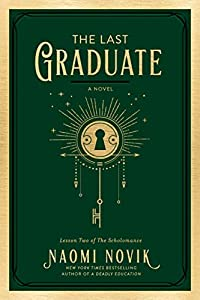
I haven’t tried the Scholomance series yet, but I have to admit it does sound like fun. I don’t mind the idea of a high body count as long as the tone of the story is light. Yaron commented the death and violence and gore and violence are much more… cartoonish? in this series, and that is the tone I mean. Anyway, the first book is only $2.99, and I picked it up. I kind of forgot that it’ll probably turn up in the Hugo voter’s packet or I would have waited, but as I say, it was inexpensive, so whatever.
But this did make me think of a perennial topic — second books that are as good as the first.
It’s a cliché that second books — second books in particular, not just sequels in general — are often weak. There are lots of reasons for that, although the one that gets cited the most is: The author had all the time in the world to polish the first book, but then suddenly there’s a contract with a deadline and the second book has to be written in a hurry. That certainly makes sense, particularly if the author wasn’t thinking about sequels until the contract asked for one.
In addition, the first book in a trilogy always has the pleasure of getting to know the characters and the world, while the third always has the ultimate climax. The second book is … well, it’s in the middle.
However, there are also quite a few counter examples. I’m sure I’ve done posts on this before, but probably not for a while, and I know I’ve read more books since then, so let’s try it again. I do want to try to stick specifically to second books of trilogies. What are some trilogies, trilogies specifically, where the second book is as good as, or even better than, the first book of the series? I have some contenders and I’m sure you all will think of others.
In no particular order:
1. Catching Fire in the Hunger Games trilogy. I started off by thinking, Oh, this again? and not feeling like the story was doing anything new. Then it did something new, as we pull back from Katniss’ individual story to the broader story that surrounds her. I wound up liking this book a lot. I’d set The Hunger Games and Catching Fire as about equal, while I had some problems with the ending of the trilogy and therefore tend to put Mockingjay down several rungs from the first two books of this trilogy.
Days of Blood and Starlight in Lani Taylor’s Smoke and Bone trilogy. This is one of the very (very) few high-angst YA fantasy trilogies that really works for me. That’s because Taylor is just such a great writer. In this case, the second book is independent enough to make a satisfying second book, even though its also inextricably a part of the overall story.
What is it with publishers redesigning books so that the covers are much worse than they used to be? Honestly, what is WITH these new covers? Let me just pause for a moment. Pick a cover:
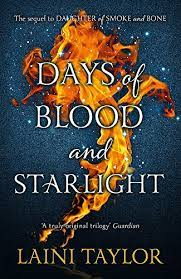
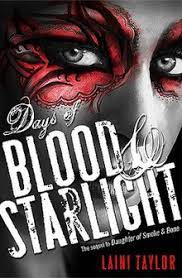
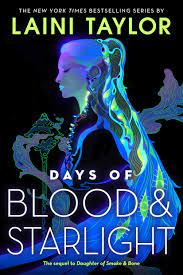
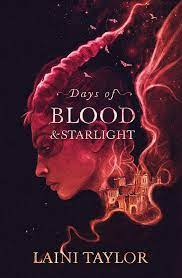
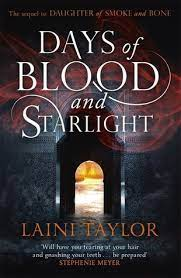
Okay, which is your least favorite? For me, it’s the blue one in the middle of the series. Guess which one is the current cover? Yep, that’s the one. I think I like the last two the best, but I live every single cover here better than the blue one in the middle.
But FINE, moving on.
2. The Demon’s Covenant by Sarah Rees Brennan is my next pick. Every book in this trilogy is excellent. The second might actually be my favorite, sometimes, in some ways, but it’s hard to choose. Sure, I don’t like certain details, but hello, it’s a whole trilogy, of course I dislike certain elements. Each book in the trilogy emphasizes a different pov protagonist, though there’s one overall plot. That’s a somewhat unusual structure. All the different points of view work about equally well for me, which is even more unusual. This is an intense story, rather dark — okay, quite dark in places — but overall this is a positive story. Obviously. You know me well enough to know I wouldn’t enjoy anything in the region of grimdark. Here are my more extensive comments about this series.
3. Like a River Glorious by Rae Carson. Here are my comments on the first two books of the trilogy, before the third was released. I don’t know that I ever commented on the third once it was out, but it was also really good. This is just a wonderful trilogy, with a strong through-line. Although readers might feel some section sags, I did not, and I think that feeling is more likely in the first book than the second. There’s a long slice-of-life journey west through the Great Plains — I guess I should say, this is a historical fantasy trilogy set during the Gold Rush, very heavy on the history and light on the fantasy. While sometimes a long journey can bore me, in this case, I enjoyed it and felt no need to skim ahead to the arrival in California
4. Two-Bit Heroes, the second book of Doris Egan’s (Jane Emerson’s) Ivory trilogy. Which, I’m sorry to say, do not appear to be available in ebook format, which is a crying shame. I loved these books when they were first published and I still love them, and I’m not sure whether the first or second book is my favorite. I’m still mad that Egan did not go on with this series. This was before an author could easily move into self-publishing, which is a real shame. The three mass-market paperbacks look like the more cost-effective option if you pick them up used: that would be Gate of Ivory, Two-Bit Heroes, and Guilt-Edged Ivory. Honestly, even if you never read paper editions of anything, these are well worth picking up your reading glasses.
5. Gemina, the second book of the Illuminae files by Kaufman and Kristoff. It’s hard to think of a more fun trilogy out there. Really delightful, exciting, a bit over the top … okay, thoroughly over the top. But so much fun! I’m sure by the end, readers are very sure that no matter what SEEMS to be happening, everything will turn out well. And it does, no matter what violence Kaufman and Kristoff have to do to their world to make sure of it.
For this trilogy, I have to suggest that the print version is the way to go simply because of all the weird print effects.
6. Ancillary Sword. I know some people found Ancillary Sword disappointing after Ancillary Justice. I didn’t have that reaction at all. It’s a story that happens in a smaller scale, that’s true. I liked that feature of the story. I liked and admired almost everything about this trilogy, but for me, the second book was better than the first. The central problem Breq needed to deal with in the second (and third) books appealed to me more than the central problem of the first book; and some of my favorite characters didn’t appear till the second book, and really, overall, the second books is right up there for me.
7. Paladin of Souls in the Five Gods world. If you take the three novels as a trilogy, with the Penric novellas treated as associated content, then I think the first book is the best, the second is almost as good, and the third is much less good. I know a lot of readers put the second book at the top for this trilogy and I get that, though for me it’s impossible to beat Caz in The Curse of Chalion. But I think most people agree that Paladin is right up there in quality.
I’m now going to cheat:
And, take a look, the whole trilogy is listed for $1.99 at the moment. Hatchette does that periodically. So seriously, this is the time to click through and buy this trilogy. And when you do, I will just say up front, the second book is my personal favorite. It’s not even close. I had the worst time coming up with a plot and a protagonist for this book — everything that occurred to me was YA — so I finally said, “Fine, you know what, the protagonist is a 42-year-old man” and went on from there. THAT broke it out of YA mode in a hurry, after which, as I say, it turned into one of my favorites. I really like Gereint … and Beguchrin … and Tehre … and here we are, with a story I truly enjoyed writing and still enjoy years afterward.
9. Tarashana
The main trilogy is Tuyo – Tarashana – Tasmakat. Everything else is offset from that trilogy. That makes Tarashana the second book of a trilogy.
I do not, of course, expect every single reader to agree, but I think Tarashana is just about as good as Tuyo. Sure, you only get the big reveal once. Nevertheless.
The cover for Suelen is in progress, by the way. I’ve seen two drafts. Hopefully I’ll be showing the final version to you by the end of the week. I’ll put Suelen up for preorder as soon as the cover’s ready. I’m going to schedule it for release about June 25th, I expect.
But! That turns out to be nine second books! Leaving:
10. Your Suggestion Here
What’s another second book of a trilogy that stands out for you? Something that’s close to as good as, maybe even better than, the first book? I’m sure there must be plenty of other trilogies where the quality doesn’t drop off dramatically in the second book.
Please Feel Free to Share:






The post Second books in trilogies: The Good Ones appeared first on Rachel Neumeier.
Suelen: Available for Preorder
Here we go! Here’s the cover for SUELEN, which is now available for preorder — or will be in a few hours, at least, since I just hit “go” on the preorder button at KDP.
I’ve pegged it to release on June 17th, and yes, I’ll be running a sale on the Tuyo series starting on the same day.
I’m really interested and excited to see what readers think of this one. It’s SO different from KERAUNANI. That one is fun. This one is much more serious, but I think I like it as well, though not in the same way.
 Please Feel Free to Share:
Please Feel Free to Share:







The post Suelen: Available for Preorder appeared first on Rachel Neumeier.
Recent Reading: Emissary by Melissa McShane
Okay, so, first, I’m glad to say that I am indeed finally moving forward with Invictus. For the first time in I don’t know how long, I’ve written a whole new couple of chapters rather than just revising stuff I wrote two years or more ago. Hopefully nothing will derail forward progress before I’ve finished a complete draft, but I’m expecting various distracting events in the near future, so we’ll see. Regardless, I’m definitely finished with revision until I have a complete draft, which is a great relief.
Coming up next, I need to have the protagonist plausibly make an important decision and then I need to transition into the next scene, which should hopefully be at least moderately exciting for me even though I do know how it works out, and with any luck significantly more exciting for eventual readers.
I set a minimum of just 1000 words per day, btw, on the theory that I can make that on almost any day. I’m happy to say that I’m actually averaging twice that, which is satisfying. I didn’t touch my laptop on the 8th, but I knew that would happen because I was scheduled to spend most of the day helping judge the local science fair (Middle School Life Sciences) and then most of the evening helping with a fish fry. The best few science fair entries were excellent, incidentally. The kids did a great job presenting their projects and demonstrated impressive grasp of relevant background material and the basics of how to design projects. I’ve probably judged that category, I don’t know, ten or a dozen times, and I always enjoy it very much.
But, moving on to the actual topic: now that I’m in a period where I’m not nearly as absorbed by my own writing, I’m naturally much more interested in reading books by other people. Various commenters here have pointed me toward Melissa McShane before. As a result, I had three of her books on my Kindle TBR pile, so I picked Emissary because it is a short standalone novel.
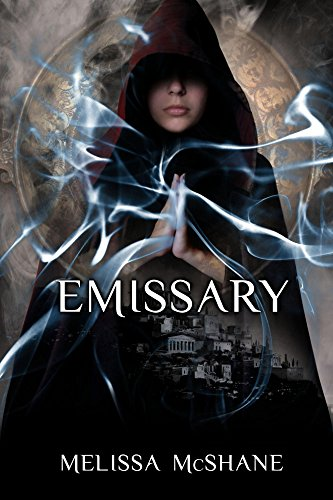
So, overall conclusions first:
I wasn’t going to say this novel was a nice surprise, because honestly I expected to like it quite a bit. After all, I nearly always do like the novels you all recommend. But on the other hand, this novel was a nice surprise, because I did not expect it to remind me so strongly of the White Rat series by T. Kingfisher. I know many of you like that series, so let me suggest that if you haven’t yet tried anything by McShane, you might give this novel a try. A bunch of things struck me as similar, including some elements of the style, the romance plotline, and the worldbuilding.
Writing style: While the writing style is similar in many ways, with plenty of witty dialogue between the protagonist and the male lead, I will say that this novel is not overall as lighthearted. Not that it lacks humor. But the White Rat novels seem rather tongue-in-cheek in so many ways and Emissary doesn’t.
But, though I wouldn’t say that Emissary is lighthearted, and definitely not tongue-in-cheek, it does have a positive feel to it. I trust saying that I found this a low-stress story doesn’t constitute a spoiler. I don’t think the reader can possibly doubt that a happy ending is coming up, and even when various events might suggest otherwise, that confidence in a happy ending isn’t likely to be shaken.
Romance plotline: The White Rat novels are explicitly fantasy romances, which is extremely clear from the first paragraphs. The romance is centered in each of these novels. In contrast, at first I thought Emissary was going to feature a platonic M/F friendship all the way through. When I realized the story was actually going to turn into a romance, my first reaction was disappointment. I would have liked a centered friendship. However, I have to admit, once I adjusted my expectations, I honestly did like the way McShane handled the romance element.
I liked how slowly the romance is introduced, with none of the more over-the-top elements common in modern romances. I mean the he’s-so-hot swoony elements. Generally I just tolerate that sort of thing and I was happy not to have to tolerate it here. Then, once the protagonist realizes she’s fallen in love with the male lead, there’s a mercifully brief burst of angst, which amazing enough is not painful to read through. Then, boom, a solid relationship, which is not shaken by any later events.
Worldbuilding: You know how in the White Rat series there are all those gods and they’re quite real and rather active. Same thing here, though of course all the specifics are different. I wasn’t too crazy about the gods when they stepped on stage. They were just like people, not especially awe-inspiring or hard to understand or whatever. Just, basically, people, full stop. Not that gods can’t be shown that way; that’s how gods are shown in, oh, MWT’s Thief books, pretty much, or for that matter the Greek gods from actual mythology. Just not my favorite presentation, that’s all.
The one worldbuilding element I thoroughly dislike in the White Rat series – that awful religious sect, whatever it’s called – is totally missing in the world of Emissary. It’s true that the priests of the god of death may be viewed askance, but that’s because, you know, god of death, the whole concept makes people understandably nervous.
The most entertaining worldbuilding element is that McShane takes the most typical, ordinary ghostly manifestation possible, has those apparitions appear in this novel, and declares, These aren’t ghosts. Sure, they look like dead people and they echo the actions of those dead people and they don’t respond to the living and they’re immaterial and everything, but nope, those aren’t ghosts. Ghosts are something totally different. I appreciated the way McShane built her world, with zero infodumping and a lot of snazzy little details slipped into the story. Also, I love the way the priests of the god of death refer to dealing with a ghost as Consolation. This is one of the many details that creates the positive feel of the story.
Characterization: Maskelle in Martha Well’s The Wheel of the Infinite is a great favorite of mine for any number of reasons. One of those reasons is that she’s both powerful and confident of her power. Zarafine in Emissary is neither that powerful nor that confident, but she’s in the same basic category. She’s a priestess, more or less, of the god of death, and you know what, you really do not want to irritate the god of death. Anyway, she takes her duties seriously and I liked her a lot.
I liked her bodyguard, who’s been her best friend for six years. I suppose you all just immediately guessed how the romantic element is handled in this story, and you would be right. I like bodyguards and I liked this bodyguard, and I particularly liked the fight he had with Zaraphine in the middle of the book. That was believable and it kept either of them from being too perfect, plus it was an important transition toward their mutual realization that they both wanted to reconsider the platonic friendship thing.
The single element of characterization I appreciated most wasn’t at all important. Nevertheless, I appreciated the way McShane neatly shifting an unsympathetic character to the sympathetic category late in the story. I didn’t see that coming and I always, always like that kind of reorientation of the reader’s view of a character. McShane handled that just about as neatly as Barbara Hambly does it. Not that Hambly does it in every book, but it’s not rare, which is how I realized that “Barbara Hamilton’s” mysteries were actually by Barbara Hambly. Anyway, in this case this shift is not all that important to the plot, but I really liked seeing it.
Overall rating: Four and a half stars? Something around there.
I liked Emissary a lot and I most particularly liked it as a well-written low-stress novel, pretty much exactly what I wanted. Not as beautifully written as Marie Brennan’s Rook and Rose series, which I haven’t been able to bring myself to pick back up because it’s so high-tension; substantially better written than KM Shea’s Court of Midnight series, which I enjoyed but which did not make me want to look for more of the author’s books.
Having finished Emissary, I immediately went on to another of McShane’s books. This is the first Tremontane book. I like it very much so far, and since this one is very obviously a romance, I won’t have that little moment of disgruntlement that I had when Emissary moved in that direction.
I’m still very close to the beginning, so all I can say right now is I do kind of wish Alison would say directly, “I don’t know how you can have failed to realize this, but I just can’t stand that kind of compliment, the kind you just trotted out with that stupid little purr in your voice that you probably think sounds seductive. Cut it out and I’m sure we’ll get along much better.” I’m pretty sure Anthony would respond well to a really direct approach. Also, if somebody isn’t stealing valuable books from the royal library, I will be absolutely astonished.
Please Feel Free to Share:






The post Recent Reading: Emissary by Melissa McShane appeared first on Rachel Neumeier.
April 12, 2022
On Kindness
Here’s a thoughtful and interesting post at The Marginalian: How Kindness Became Our Forbidden Pleasure
[Y]et, although kindness is the foundation of all spiritual traditions and was even a central credo for the father of modern economics, at some point in recent history, kindness became little more than an abstract aspiration, its concrete practical applications a hazardous and vulnerable-making behavior to be avoided — we need only look to the internet’s “outrage culture” for evidence, or to the rise of cynicism as our flawed self-defense mechanism against the perceived perils of kindness. …
…People are leading secretly kind lives all the time but without a language in which to express this, or cultural support for it.
Are we? Is that true? What a sad thought. But I don’t really think it is true. Not that one doesn’t run into shockingly rude and mean people, but I personally expect to see most people being kind most of the time.
Could this be an urban vs rural perception? I wonder, because I expect that when it snows, a neighbor will plow our driveways. When I recently put air in my tires and the numbers on the readout didn’t indicate that air had been added, the next day I called this neighbor and asked if I could check the actual pressure with his tire gauge and not at all to my surprise, he said, “Oh, bring your car over and I’ll check the tire pressure and add air if necessary.” (The readout inside the car was wrong; the tire pressure was higher than the numbers indicated.)
Anyway, I expect to see the car in front of me brake to avoid hitting a squirrel and swerve gently to avoid a turtle, the same way I would. That’s what people do, generally, most of them.
A few years ago, when my Honey disappeared from a new home into the St Louis streets, I was soooooo grateful that a jogger took the time to coax her over and pick her up and then got on Facebook and found my lost dog post and contacted me. I will always be grateful to that jogger! But I wasn’t surprised.
People I know routinely say things like, “I’m worried about my neighbor; she doesn’t drive and I think she’s having a hard time. I think I’ll swing by on my way home and see if she needs anything.” I mean, this is perfectly normal and ordinary. This is how people behave. Isn’t that how people behave?
The most paradoxical part of the story is that for most of our civilizational history, we’ve seen ourselves as fundamentally kind and held kindness as a high ideal of personhood. Only in recent times — in large part thanks to Emerson — did the ideal of independence and self-reliance become the benchmark of spiritual success.
I really don’t see it. My most self-reliant neighbors are the ones who are most happy to do stuff for other people. They have the chainsaws and the little bulldozer and the air compressor and all that stuff. It seems to me that people who are able to be helpful, are helpful, most of them, most of the time.
Not that we don’t have crazy neighbors too. Don’t get me started. But that’s not the rule.
You know, this is making me think of The Curse of Chalion. You remember when Bergen says to Caz that he had never valued kindness because kindness seemed so easy and trivial. Let me see, yes, here:
“Any man can be kind when he is comfortable. I’d always thought kindness a trivial virtue, therefore. But when we were hungry, thirsty, sick, frightened, with our deaths shouting at us, in the heart of horror, you were still as unfailingly courteous as a gentleman at ease before his own hearth.”
I had forgotten this conflation of kindness with courtesy. That’s a different dimension of the topic. But I wonder if, to the extent that kindness might be forgotten or rejected in some parts of modern society, that might be because people are sufficiently comfortable to consider kindness a trivial virtue.
I don’t really know how to wind up this post, so I’ll just suggest that probably today would be a good day to do something nice for someone.
Please Feel Free to Share:






The post On Kindness appeared first on Rachel Neumeier.
The Best Short Stories of All Time: Book Riot
Here’s a post at Book Riot: The Best Short Stories of All Time.
I must admit that EVEN TODAY, four years after Book Riot’s post about classic Urban Fantasy, that is still the post that leaps to mind for me when any Book Riot post says: Here’s the Best ____ of All Time. I can’t help it. I won’t say that post scarred me for life because it was too mind-boggling and funny to produce a scar. But Book Riot is NEVER going to live that down in my mind. NEVER.
However, even though I don’t know much about SFF short stories, particularly not more recent (past thirty years) short stories, I guess I’m mildly curious about which stories they may pick out for this post.
Here are the ones that come to mind for me:
“Nightfall” — Asimov, of course
“Arena” — Frederick Brown
“A Pail of Air” — Fritz Leiber — oh, Leiber, really? I didn’t like his sword and sorcery, which is what I associate with his name.
“The Father Thing” — Philip K Dick
“Kaleidoscope” — Ray Bradbury — again, I didn’t remember this was by Bradbury. No wonder it was so poetic.
The first of those stories is just one I happen to remember; it didn’t strike me particularly. The others are all from a short story collection I read as a kid, practically my first exposure to SFF ever. How that collection wound up in a grade-school classroom, I have no idea. The stories were so much more powerful than anything else in the classroom because, you know, they were not actually meant for children to read. Which I didn’t realize at the time. I probably had nightmares. You know what, I specifically remember revising “Arena” in my head to be nicer to the lizards. I had totally forgotten that until I thought about that story now. That’s one of the first times I remember doing that, though the impulse to revise grim scenes has certainly been a motivation to me as a writer.
Anyway, I have no idea whatsoever what SFF stories would broadly be considered “The Best Ever.” Let me take a look at this Book Riot post and see if I’ve ever heard of any of the stories they nominate …
Oh, I haven’t read this story, but I do recognize Ted Chiang’s name. I’ve read a collection of his stories. He is indeed an amazing writer. They’re often very powerful, memorable stories.
Here’s a … Sherlocke Holmes story? Oh, now I see that the post isn’t “All-Time Best SFF stories,” but “All-Time Best Short Stories” period, without regard to genre. I totally missed that. Sorry. Makes a big difference. Fine then, a couple of the few non-SFF stories I remember were written by Saki, so now I’m wondering if those are on this list. Moving on …
“The Yellow Wallpaper” — yeah, that was assigned in some class or other. I didn’t like it a bit. People going mad, not my thing.
Oh, now, THIS looks like fun:
A WITCH’S GUIDE TO ESCAPE: A PRACTICAL COMPENDIUM OF PORTAL FANTASIES BY ALIX E. HARROW. Some people come to the library looking for an escape; some librarians know just the books to push them toward. This story won the Hugo and the Nebula.
I’m going to click through and read that one.
Oh, here’s “The Ones Who Walked Away from Omelas.” Yes, well. It’s an effective story, but I liked many of the alternate endings presented in a collection … where was that … Oh, it was at File 770 and the link is broken. Here’s my post which features a small handful of my favorite endings to this story.
Overall, this is an interesting list, with more stories and authors that I’ve heard of than I really expected. Many are SFF authors or have written SFF stories. If you’re a short story fan, by all means click through and see if there’s anything you especially like or dislike on this list. Most or all of the stories have links to online versions or to the book in which the story can be found.
Please Feel Free to Share:






The post The Best Short Stories of All Time: Book Riot appeared first on Rachel Neumeier.
April 11, 2022
the Worst Plot Element
So, a trope or plot element that I truly detest is betrayal. I just loathe treachery, and the more important betrayal is to the story, the more I hate it.
I didn’t realize that until pretty recently. That is, I don’t think I’ve pulled out “treachery” as a trope I especially hate before. That seems strange to me now, because it’s such a total turnoff most of the time. I don’t like it if a trusted friend or, for example, a sibling, is betraying the protagonist. I don’t like it if it’s a romantic partner. I hate it if it’s a bodyguard. I’m not even keen on this plot element if it’s a chance-met acquaintance! I just do not like betrayal as a plot element at all, period. It’s worst of all if the protagonist goes on and on and on without realizing that she is being betrayed. It takes a remarkable writer to pull that off, and even then it’ll put my teeth on edge.
However, there are in fact three ways to make this plot element work for me. Just three, I think, and all three can fail if the author is the least bit clumsy in handling the element of treachery.
It’s not really betrayal, or The betrayer follows a redemption arc, orThe treacherous friend/sibling/whoever gets what’s coming to them.Let’s take a handful of examples. And, let me just say, this is the very first post where I have taken a stab at adding affiliate links, and thank you to those of you who suggested this recently. It would be nice to know if I’m doing it right, so if you have an inclination to click on a link and buy one of these books, this would be a good time to do that.
Now:
Here’s the description for Gillian Bradshaw’s The Sand Reckoner:
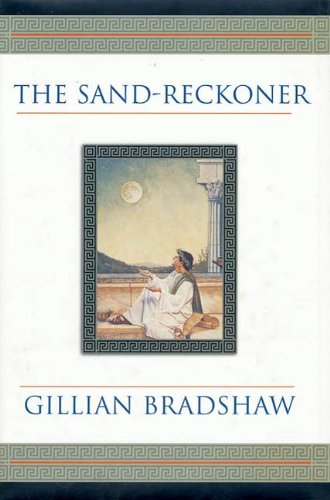
The young scholar Archimedes has just had the best three years of his life at Ptolemy’s Museum at Alexandria. To be able to talk and think all day, every day, sharing ideas and information with the world’s greatest minds, is heaven to Archimedes. But heaven must be forsaken when he learns that his father is ailing, and his home city of Syracuse is at war with the Romans.
Reluctant but resigned, Archimedes takes himself home to find a job building catapults as a royal engineer. Though Syracuse is no Alexandria, Archimedes also finds that life at home isn’t as boring or confining as he originally thought. He finds fame and loss, love and war, wealth and betrayal — none of which affects him nearly as much as the divine beauty of mathematics.
I love Gillian Bradshaw, so I picked this up without much hesitation. But I sure wasn’t thrilled at the mention of betrayal.
It turned out that this wasn’t actually betrayal in any way that mattered, so I was happy. This plot element is SO minor and SO not actually betrayal that the word really ought not have been used in the description. This is actually one of my favorites of Bradshaw’s books, although that’s a high bar and I’m not sure it’s actually in the top three. Regardless, it’s a fantastic example of an author writing a protagonist who is an actual genius. Needless to say, that’s not easy. With Archimedes, it’s probably not as difficult as it might be for certain other genius characters, because math-and-physics genius is easier to write (in some ways) than political or tactical genius.
But my point is, if it hadn’t been Bradshaw, I would never have known I loved the book, because I’m quite unlikely to pick up a book if the word “betrayal” is anywhere in the description. I doubt it’s possible to sort out which specific words turn off ten times more readers than they attract, but it’s hard to believe that “betrayal” isn’t among those words.
Bradshaw also wrote another book that featured both (a) a genius protagonist, and (b) betrayal, but not really: Magic’s Poison.
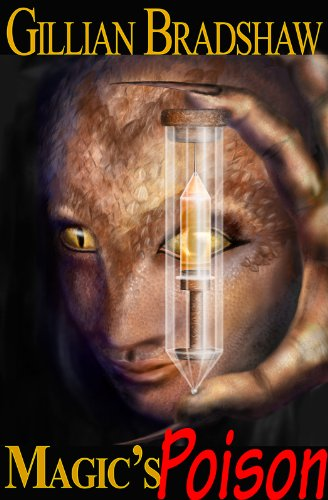
Forget the not-great cover and read the book. Here are my comments about this fantasy series. But the key point here is that this story features a very dramatic betrayal, only the astute reader will be highly suspicious that it’s not really a betrayal. Sure enough, it isn’t. Anything but. What we have here is a story where a tactical genius sets up a situation that looks like a betrayal in order to fulfil his own goals while also protecting the person he seems to have betrayed. This whole thing must have been tricky to pull off, needless to say. I mean, tricky for the author. This is the kind of plot twist I love. It’s a quite remarkable series, with the books getting better as you go along. These aren’t linked in a series page, so: Book 2 is The Enchanted Archive, Book 3 is The Duke’s Murder, and Book 4 is The Iron Cage. Book 4 is the best imo, but they ought to be read in order even though the first two books are perhaps a bit flawed.
Here’s another example, and in this one, the tension goes sky-high because it’s impossible to believe that the characters could possibly be betraying each other as they seem to be, but at the same time, it’s quite difficult to tell whether they’re actually putting on a show: The Demon’s Lexicon series by Sarah Rees Brennan.
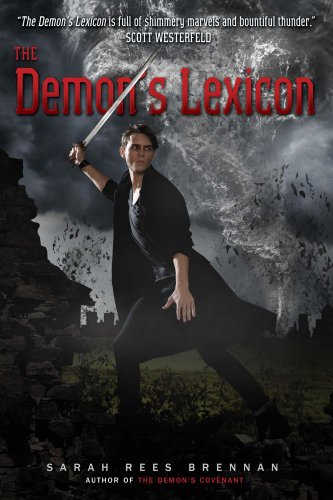
This is the kind of series where the pov changes from one book to the next, but there’s one overall plot arc. You don’t see that very often, and Brennan pulls it off very nicely. The second book is The Demon’s Covenant and the third is The Demon’s Surrender.
These are very intense novels. The situations get grim. If you’re thinking, hmm, maybe not this year, I don’t blame you. If you read this series, more than once you are likely to find yourself thinking, Can he REALLY be doing what he seems to be doing? Is it POSSIBLE that she could be doing what it looks like she’s doing? Good Lord, PLEASE tell me this is part of a clever plan!
And, of course, since I’m mentioning these books in this post, you will now know that no, he isn’t, and no, she isn’t, and yes, it is. But it’s still going to be intense, believe me.
The above titles all feature betrayals that aren’t really betrayals. That isn’t actually what led me to write a post about this topic. This is:
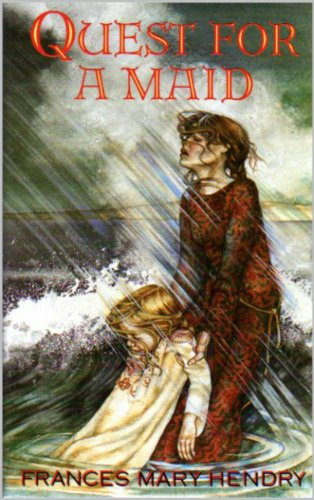
And that is why I said in a recent post, that for a bit there I couldn’t believe some of you had recommended Quest for a Maid. Because seriously, treachery is just not at all what I was looking for. I thought about it, and eventually decided that what with one foreshadowing element and another, this isn’t too much of a spoiler. I hope it’s not, anyway.
This isn’t a story where the betrayal is faked or otherwise not really a betrayal; it’s one with a redemption arc. The redemption part was rather slow to appear, but it was solid in the end, which made all the difference in the world. Well, that and another little detail. That would be a spoiler, but it did make the ending much happier overall.
This doesn’t mean that this kind of treachery suddenly turns into my favorite plot element, by the way. It’s just that a redemption arc that makes treachery acceptable to me, rather than making me recoil and swear off other novels by the author. I am having a certain amount of trouble thinking of other novels with this kind of betrayal-redemption plot arc. I’m sure there are zillions. I feel like there are a clutter of examples on the tip of my tongue. If anybody can think of one, please drop it in the comments.
The third possibility, that it’s real treachery and not redeemed, is not my favorite thing even if the treacherous person gets what he deserves in the end. Again, that’s acceptable, but not a plot element I really enjoy. I can think of just a couple of novels that worked for me. One is Peranesi by Susannah Clarke.
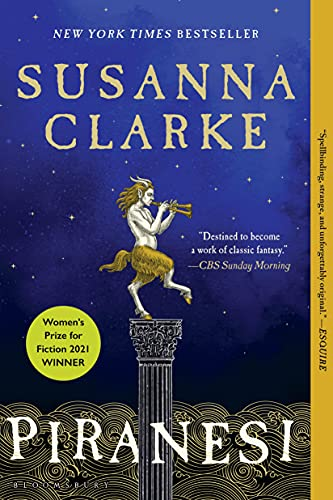
Several elements contribute to the success of this novel despite the obvious, egregious selfishness, pettiness, and treachery of the secondary character:
–The writing and the setting are both just so beautiful.
–The reader is in absolutely no doubt about the treacherous nature of the secondary character, but somehow the innocence of the protagonist is not a problem. This is strange. I think it has to do with the remarkable nature of that innocence, so far beyond what we normally see in ordinary characters that it doesn’t cause the reader to roll their eyes and say How can he be so stupid? It’s not like that at all.
–And, finally, yes, the treacherous character gets what he deserves. The plot of the story is therefore just. That wouldn’t be enough on its own, but in combination with the other elements that contribute to this story, it is.
I wonder if any of you are thinking of the other one that came to mind for me with regard to this type of betrayal? It’s The Return of the Thief by MWT.
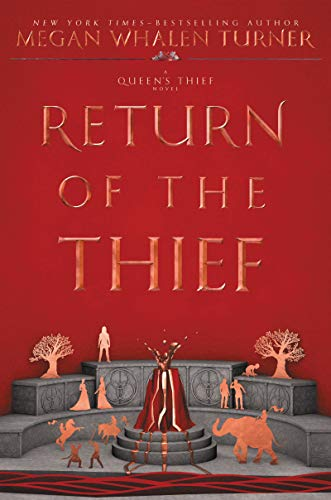
Here, the betrayal element did not bother me because I saw it coming, because I trusted Gen probably had a plan — I certainly did wonder about that partway through, I must say, because he did fool me when it came to the moment. And most of all because the aftermath of that whole scene was just so remarkable. That’s the moment where I thought that if I’d been the Mede general or lord or whoever was in charge, I would have said, Oh, huh, look at that, I kinda have the impression the gods are not on our side in this conflict, so you know what, time to go home.
I think this sort of plot element must work best for me if something about it is fairly far out of the ordinary. Although they’re so different, both Piranasi and The Return of the Thief do have that in common: whatever is going on that’s related to the betrayal is contained within a broader plot that is indeed astounding in some way.
So, basically, for me, although I generally can’t stand treachery and betrayal as plot elements, the exceptions are (best!) it’s not a real betrayal; redemption plot arcs, and justice-is-done endings. Nevertheless, for me, if the book description includes the word “betrayal” or “treachery,” that book is going to be a very hard sell. If the description also says “amazing plot twist,” that might do it by implying that one of those three elements might tilt the betrayal into some form that I either enjoy or at least appreciate. Or maybe not. Seriously, those are just not words that make me click through to download a sample.
How about you all, how do you feel about treachery as a plot element?
Please Feel Free to Share:






The post the Worst Plot Element appeared first on Rachel Neumeier.
April 8, 2022
The Interior Life
Yesterday’s post wound up with a suggestion not to set flashbacks off with “italics or a different font.”
That made me think at once of times when it’s fine to use a different font. In particularly, how many of you remember how Katherine Blake did that in her highly engaging novel The Interior Life? This is a narrative that switches back and forth between a contemporary woman dealing with ordinary tasks and a woman in a secondary world fantasy dealing with tasks that start of mundane and then segue into an epic fantasy plot. The two threads are told in subtly different fonts.
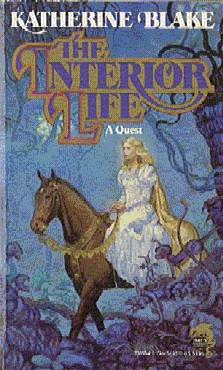
This is a story I recommend, by the way. The story is especially interesting because of the way the contemporary, mundane story takes on much greater interest in juxtaposition to the fantasy story. And the two stories are so completely separate. No one ever moves from one world to the other. Very odd novel, but as I say, I liked it a lot. Katherine Blake is actually Dorothy Heydt, by the way. Here’s a post by Jo Walton at tor.com about this novel.
The Interior Life is grounded in the feminine virtues of nurturing and support, and it takes this seriously in a way that a lot of feminist SF and fantasy doesn’t quite manage. From Tehanu to Thendara House there’s a self-consciousness in the way we’re told these things are important while being shown that they’re not. Heydt avoids that entirely by writing about them with a heartfelt sincerity. It’s also a cheerful positive book—not just a book with a happy ending, but a resolutely upbeat book. It’s a really enjoyable read. No wonder it sank without trace.
I hadn’t thought of it that way, but this is totally true.
Jo Walton goes on:
The narrative switches between worlds without missing a beat, sometimes several times in the same paragraph—by the time you’re switching between the PTA tea-party and the coronation you don’t even notice that it’s odd. Heydt has said that she intended to use different typefaces to represent the different viewpoints, but this didn’t work out—fortunately it wasn’t necessary, all the cues are there and it is never hard to follow.
The fonts are so similar, that’s why she said it didn’t work. You have to squint to see the difference, but you can see it. However, Walton is right, the writing is smooth, so you can follow the story easily.
The only other book by Heydt that I know about is A Point of Honor, which is also good, though not as interesting as The Interior Life. I don’t see any description of A Point of Honor at Amazon, so here is a link to my comments about this book. Neither book is available as an ebook as far as I know. Used copies are available and well worth picking up.
Please Feel Free to Share:






The post The Interior Life appeared first on Rachel Neumeier.
April 7, 2022
Worldcon
I expect to go to Worldcon this year because, I mean, it’s in Chicago. All else aside, that’s hard to resist since (a) the drive is not insane, and (b) I can stay with my brother, which is a significant bonus right there.
I don’t know yet whether I’ll be voting on the Hugo, though. Here’s the list of nominees in the fiction categories. I will just note that I have read almost nothing that has been nominated. Only the Kingfisher series novels; that’s it.
Will I have time to read anything? Who knows? Almost certainly not all, or even most, of the novels. I will be pleased to vote for Navah Wolfe for Editor, Long Form. She was my editor for The Mountain of Kept Memory and she did an amazing job with it. Lots of work for me, but it wound up substantially better. She was also my editor for Winter of Ice and Iron, but Mountain stands out as the one book of mine where the editor did the most work and caused me to revise most heavily and to best effect.
I expect I’ll read the short stories because they’re short. The rest of these, middling to highly unlikely. I do like the title A Desolation Called Peace. Sounds really grim, but it’s still a great title. I’ve always liked that line from Tacitus. To ravage, to slaughter, to usurp under false titles, they call empire; and where they make a desert, they call it peace. Such a great speech!
Maybe I’ll read that one by Weir, since I loved The Martian. But I won’t feel comfortable voting on a category unless I’ve at least read part of each entry in the category.
If any of you have read anything here and give it an enthusiastic thumbs up, I’ll try hard to read that. Oh, and if you’ve read anything here and give it a disappointed shake of your head, you might mention that as well.
Best Novel
A Desolation Called Peace , by Arkady Martine The Galaxy, and the Ground Within , by Becky Chambers Light From Uncommon Stars , by Ryka Aoki A Master of Djinn , by P. Djèlí Clark Project Hail Mary , by Andy Weir She Who Became the Sun , by Shelley Parker-ChanBest Novella
Across the Green Grass Fields , by Seanan McGuire Elder Race , by Adrian Tchaikovsky Fireheart Tiger , by Aliette de Bodard The Past Is Red , by Catherynne M. Valente A Psalm for the Wild-Built , by Becky Chambers A Spindle Splintered , by Alix E. HarrowBest Novelette
“Bots of the Lost Ark”, by Suzanne Palmer (Clarkesworld, Jun 2021)“Colors of the Immortal Palette”, by Caroline M. Yoachim (Uncanny Magazine, Mar/Apr 2021) L’Esprit de L’Escalier , by Catherynne M. Valente (Tordotcom)“O2 Arena”, by Oghenechovwe Donald Ekpeki (Galaxy’s Edge, Nov 2021)“That Story Isn’t the Story”, by John Wiswell (Uncanny Magazine, Nov/Dec 2021)“Unseelie Brothers, Ltd.”, by Fran Wilde (Uncanny Magazine, May/Jun 2021)Best Short Story
“Mr. Death” , by Alix E. Harrow (Apex Magazine, Feb 2021)“Proof by Induction”, by José Pablo Iriarte(Uncanny Magazine, May/Jun 2021)“The Sin of America”, by Catherynne M. Valente
(Uncanny Magazine, Mar/Apr 2021)“Tangles”, by Seanan McGuire
(Magicthegathering.com: Magic Story, Sep 2021)“Unknown Number”, by Blue Neustifter (Twitter, Jul 2021)“Where Oaken Hearts Do Gather”, by Sarah Pinsker
(Uncanny Magazine, Mar/Apr 2021)
Best Series
The Green Bone Saga , by Fonda Lee The Kingston Cycle , by C. L. Polk Merchant Princes , by Charles Stross Terra Ignota , by Ada Palmer Wayward Children , by Seanan McGuire The World of the White Rat , by T. KingfisherLodestar Award for Best Young Adult Book
Chaos on CatNet , by Naomi Kritzer Iron Widow , by Xiran Jay Zhao The Last Graduate , by Naomi Novik Redemptor , by Jordan Ifueko A Snake Falls to Earth , by Darcie Little Badger Victories Greater Than Death , by Charlie Jane AndersAstounding Award for Best New Writer
Tracy Deonn Micaiah Johnson A.K. Larkwood Everina Maxwell Shelley Parker-Chan Xiran Jay Zhao Please Feel Free to Share:






The post Worldcon appeared first on Rachel Neumeier.



